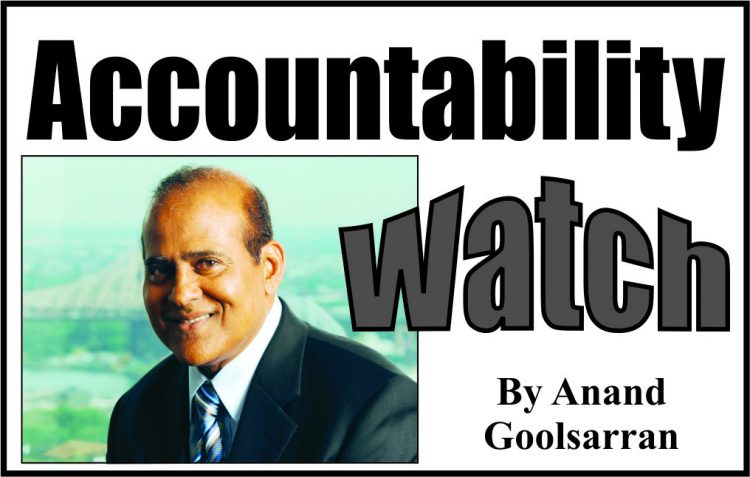 In the aftermath of the untimely death of young Adriana Younge under very controversial circumstances, violence and other acts of criminality erupted in several parts of the country involving persons from certain segments of the Guyanese society. It is unclear whether these events bear any relationship to our present political system and governance arrangements. However, it may be appropriate at this time to reflect on whether we should not implement a system of shared governance, or some form of power-sharing which is ‘a policy agreed between political parties or within a coalition to share responsibility for decision-making and political action’.
In the aftermath of the untimely death of young Adriana Younge under very controversial circumstances, violence and other acts of criminality erupted in several parts of the country involving persons from certain segments of the Guyanese society. It is unclear whether these events bear any relationship to our present political system and governance arrangements. However, it may be appropriate at this time to reflect on whether we should not implement a system of shared governance, or some form of power-sharing which is ‘a policy agreed between political parties or within a coalition to share responsibility for decision-making and political action’.
The “winner takes all’ arrangement, which has been in place since Guyana attained Independence in 1966, and perhaps earlier, has prevented the country from achieving its full potential, despite its vast natural resources, including those relating to oil and gas. This is especially so, considering the ethnic composition of society where the two major political parties derive their support almost exclusively from the two major ethnic groups. In such a situation, whichever political party wins the elections, the other major party is left out of executive decision-making and feels marginated and discriminated against. It is an acknowledged fact that every five years around election time, we have experienced political and ethnic setbacks, despite recent efforts to promote the idea of “One Guyana”, reminiscent of the failed slogan of yesteryear: “One People, One Nation, One Destiny”. Over the years, thousands of highly talented Guyanese have left our shores permanently mainly because of political instability.
In today’s article, we explore the concept of shared governance.
Shared governance in perspective
There are various models of shared governance that provide for meaningful and transparent decision-making based on the shared interest of all stakeholders. According to Marshall University, shared governance is:
A systematized structure of transparent decision-making that reflects shared interests and shared responsibility of all constituency groups…The role of constituency groups is not merely advisory; instead, decision-making is actively shared among all groups. Constituency groups thus contribute more than mere consultation before the implementation of a decision.
Shared governance relies on an atmosphere of mutual understanding, respect and trust that can foster honest communication and consideration in decision-making. Shared governance promotes transparency, accountability, inclusivity, collaboration, collegiality and interdependence among constituency groups.
(See: https://www.marshall.edu/shared-governance/ definition-of-shared-governance/)
Although the above quote relates to governance arrangements in an institution of higher learning, it has relevance to political situations where shared governance can be viewed as a form of power-sharing that recognizes the problems certain countries face where major groups compete for political power. This is especially in societies that are highly polarized based on ethnicity, religious belief, or other related factors. Shared governance implies that all elected representatives have meaningful participation in executive decision-making of the State and in the management of the country’s resources.
Guyana’s constitutional provisions
The principle of shared governance gains support from Article 13 of the Guyana Constitution:
The principal objective of the political system of the State is to establish an inclusionary democracy by providing increasing opportunities for the participation of citizens, and their organisations in the management and decision-making processes of the State, with particular emphasis on those areas of decision-making that directly affect their well-being.
Additionally, while Article 177 provides for the President to be elected from the political party that obtains the most votes in the national and regional elections, there is no specific requirement for him/her to appoint the Prime Minister, Vice-Presidents and Ministers from that party. The only requirement is that such appointments have to be made from among the elected members of the National Assembly, except that the President can appoint not more than four Ministers and two Parliamentary Secretaries from among persons who are qualified to be elected as a Member of the Assembly. A person who is not eligible to be elected President cannot be appointed Prime Minister. The Constitution therefore does not preclude having a system of shared governance involving elected representatives from other political parties. In fact, Article 13 appears to support this approach.
Former Speaker’s take on shared governance
At the launch of the A New and United Guyana (ANUG) party in January 2019, former Speaker of the Assembly, Ralph Ramkarran, urged political parties to embrace a system of shared governance. He stated that the country is politically unstable, and this is likely to continue unless there is a governance system that eliminates or substantially reduces the potential for corruption: ‘I have been convinced for a very long time –for many years– that the best solution to the problem of Guyana is a governance system that includes the major political parties’.
In a separate article on the subject, Mr. Ramkarran referred to attempts by the late President Cheddi Jagan in the mid-1970s to have shared governance, following the 1973 massively rigged elections about which this columnist had first-hand experience when he became an elector for the first time. With no way in sight in the foreseeable future for the conduct of free and fair elections, Dr. Jagan perhaps felt that the best course of action for his party to contribute to executive decision-making was to have some form of power-sharing. At the time, former President Forbes Burnham was following socialist policies that were consistent with Jagan’s approach to government, for example, nationalization which ultimately was a disaster. As Leader of the Opposition, Jagan also offered “critical support” for Burnham’s policies. Upon the latter’s death, Desmond Hoyte scrapped any attempt at shared governance.
In the said article, Mr. Ramkarran suggested, among others, that Articles 101 (1) and 103 (2) of the Constitution be amended to allow the President to appoint: (i) as Prime Minister, an elected Member of the Assembly who has been the presidential candidate from the party that gains the second highest number of votes in the elections; and (ii) as Ministers, elected Members of the Assembly from the parties that garner the highest and the second highest number of votes, in proportion to their standing in the elections, after consultation with the Prime Minister. He also advocated the abolition of the positions of Vice President and technocrats.
1992 elections and onwards
In the run-up to the 1992 elections, Dr. Jagan was emphatic that if elected to office he would discontinue the practice of “winner takes all”. Having won the elections, it took the former President two weeks to announce his Cabinet. And what a disappointment it was! It was evident that party sentiments took precedence to which Jagan must have most reluctantly acquiesced. Since then, there has been no dedicated effort to implement a system of shared governance, despite the continuation of political instability, in varying degrees, in the run-up to subsequent national and regional elections, most notably being those held in 2020. This was mainly due to the reluctance of the party that won the elections to share the spoils of victory with its opponents.
Mr. Ramkarran referred to Jagan’s understanding and acknowledgement of the deep divisions in then Guyanese society. He stated that now that roles of the two main political parties have been reversed because of the conduct of free and fair elections, the Opposition may now be more than inclined to embrace a system of power-sharing, without acknowledgement and recognition that between 1968 and 1985, elections were massively rigged to perpetuate that party in power.
Conclusion
Having experienced the events of the 1960s onwards, our views on shared governance roughly coincide with those of the former Speaker. For too long, we have embraced the system of “winner takes all” without due consideration that the overwhelming majority of electors cast their votes on the basis of ethnic sentiments rather than after due reflection on which political party in its election manifesto offers the best programmes and activities in furtherance of the public good and the national interest. It follows that whichever of the two main political parties has the greater numerical strength among the electorate is likely to win the elections. An election manifesto, it is to be noted, is a social contract between a political party and the electorate, and citizens need to scrutinize past performance to assess the extent to which the party of their choice has honoured its commitments.
Guyana’s political history has shown that there is hardly any room for a third force, except in the run-up to the 2015 elections. However, while the 2015-2020 Government did implement several measures in the furtherance of the national interest, most of the cross-over voters felt disappointed and have returned to their original bases. The next elections are due later this year, and it would be of interest to learn how the other political parties, other that the two main parties, will fare.
Over the years, both major ethnic groups have contributed immensely to the development of the country, one during the period of slavery until its abolition in 1834, and the other four years later until 1917. Since then, both groups continue to work for the common good. It follows that elected representatives of both groups should have a meaningful “seat around the table” in proportion to their standing in the elections. Any lesser arrangement is likely to stymie efforts aimed at enhancing national development, as we have witnessed so far – two steps forward, and three backwards. Infrastructure development is no development without human development which involves due consideration of the welfare and well-being of all its citizens, especially those in the lower round of the economic ladder.
As Mr. Ramkarran points out, there would be numerous issues to be resolved in order to give effect to shared governance and to ensure its smooth functioning. While the related matters be dealt with through appropriate amendments to the Constitution, ultimately the dedicated support and goodwill of the political parties will be needed. We noted that in August 2022, the Constitutional Reform Commission Act was passed. However, it took two years for the Commission to be established. Since then, very little has been achieved. It is our sincere hope that the Commission will expedite its work, especially in the area of shared governance.








